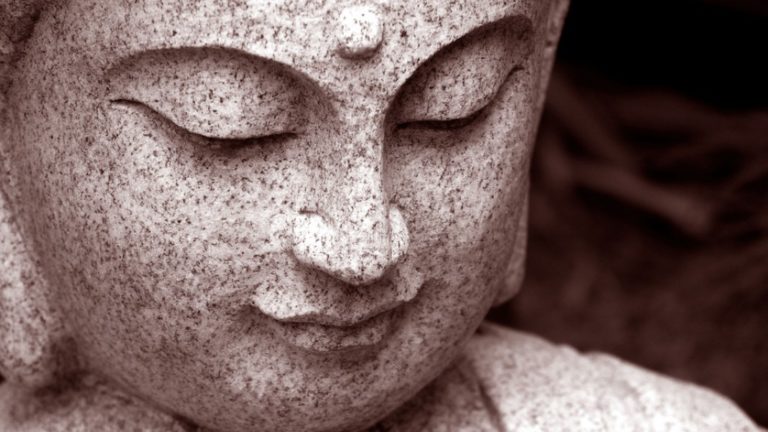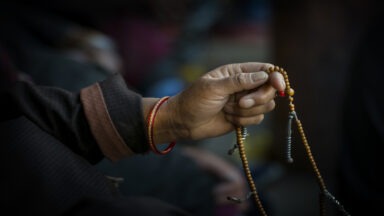Lessons from the Yoga Sutras: 3 Ways to Call Upon Compassion

Maitri karuna mudita upeksanam sukha duhkha punya apunya visayanam bhavanatah cittaprasadanam.
“Through cultivation of friendliness, compassion, joy and indifference to pleasure and pain, virtue and vice respectively, the consciousness becomes favourably disposed, serene and benevolent.” ~Patanjali’s Yoga Sutra I.33
This is my favorite sutra from Patanjali’s Yoga Sutras. This piece of text is known as the yoga bible, and is compiled into four chapters containing 196 sutras, or words of wisdom. Patanjali constructed his work in 400 BC when two styles of teaching collided. Samkhyan philosophy was known as the older style. As Samkhyan was dying out, it’s best teachings were assembled with the new teachings of the Buddha. Little is known about Patanjali himself; to some he is known as a great sage, to some an incarnation of Ananta, the mythical serpent. Although not the creator of yoga, this scholar was a great expositor.
Yoga master, B.K.S Iyengar decodes the sutras beautifully in his book, Light on the Yoga Sutras of Patanjali. In his interpretation of I.33 he states, “This sutra asks us to rejoice with the happy, to be compassionate to the sorrowful, friendly to the virtuous, and indifferent to those who continue to live in vice despite our attempts to change them.” It is this translation that continues to encourage me to trudge along a compassionate path.
I say trudge because it is arduous to continuously be gentle and soft in the way you relate to yourself and others, as Patanjali advises. I don’t know about you, but this is a hard life assignment. We are human; we are going to form opinions and will have judgments. One of the reasons why I’m so attracted to this sutra is because it seems as if my life work is to remain indifferent to the faults and imperfections of others, despite my attempts to change them. It is difficult for me to find empathy for those I can’t relate to. Others might find it difficult to muster up sympathy when someone they love is behaving in ways they don’t agree with. My friend who’s a waitress shared that she can never find warmth for that customer who snaps their fingers to get her attention. I bet that student who walks into class 15 minutes late gets on your nerves! Or maybe it’s that neighbouring car that ignores your flashing blinker and refuses to let you into their lane. Does road rage ring a bell to anyone? On a more serious note, how could you ever feel compassion for someone who’s committed a violent crime? Can you imagine experiencing mercy for all beings, including murderers, rapists, and abusers? Or is this something we leave up to the monks, priests and enlightened ones?
I read about a Tibetan monk who was imprisoned in a Chinese jail. The monk shared with the Dalai Lama that there had been many dangerous moments throughout his 18 years imprisoned. The Dalai Lama thought he was referring to moments when his life was at risk, however amazingly enough he meant, “There were times when there was a danger of losing compassion for my Chinese captors.” Unbelievable; Patanjali would be proud! Even when doctors examined him after he was released from prison, they found no post-traumatic symptoms. His being was “pure and serene”– the results promised if you approach life as Patanjali suggests. Even though at times it may seem like an impossible feat, Patanjali assures that it will lead to an easeful and fulfilled life.
Author and long time yoga teacher, Judith Lasater admits to the frustrations that come along with a life spent practicing sutra 1.33. She shares that, “just as with amity, dispassion, and goodwill that Patanjali encourages, expressing compassion is definitely a learn as you go process. It is also cumulative. We can strengthen our ability to be compassionate by repeatedly expressing compassion…It is always a partner with wisdom, which is gained from experience. And this experience leads directly back to compassion.”
As the pace of our society picks up and as we change into more of a “I, me, mine” society, we’re becoming more desensitized to others’ feelings and also to our own. It’s almost like we don’t have time to stop and feel. When we aren’t properly processing our own trials and tribulations our brains and hearts can become too full to fit in anyone else’s struggles. It’s almost like our baggage is too heavy to help relieve someone else of their load. Yet as Judith expresses, it’s through the experience of our own struggles that can lead us to empathic behaviour towards others suffering.
A kindred spirit of mine has been working with a spiritual guide for some time now. Her mentor expressed how another student of his had lived through a childhood filled with sorrow. Ironically, because of her painful past she is now more relatable and can easily access love. Often it is the distressing lessons that serve to awaken us.
Recently, I was battling an infection that left me defeated and vulnerable. I was forced to limit my movements to walking, lying down and lunging in and out of the bathtub. No yoga, no running–even long walks were a stretch. For someone who moves their body for a living, this was quite the shock to the system and a huge blow to the ego. I pushed myself and taught a few classes from the foot of my mat. Looking back, those were the most loving and authentic classes I had ever taught. Because I was feeling so raw and exposed in that moment I felt sincere unconditional love for the strangers, the regulars and the friends in front of me. My instructions were soft, my words were encouraging and I had nothing to hide. I finally understood that at some point these people, regardless of their religion, race, style, career, and financial state, had been broken down just as I was. My individual suffering had shifted to the awareness of a universal suffering, which made me feel less alone.
Upon doing further research on this topic, I was relieved to find scientific proof that loving one another is in our DNA. Renowned geologist, Charles Darwin declared that, “Sympathy is the strongest instinct in human nature.” In the documentary I am, Neurobiologist Jonathan Height fought hard to prove this point as well. “We are hardwire for a compassionate response to the trouble of others,” he declared. There is even a word in Sanskrit made to spread the news of our innate goodness and that word is Sri. It’s one of my favourites.
As Patanjali promised, a harmonious life and a complete understanding of our basic sameness is the pot of gold at the end of the road of compassion. Nelson Mandela, a man who trudged along this road for many years reminds us not to worry if we have forgotten, for our empathy can be taught. So I’ll leave it up to him to conclude my article:
“No one is born hating another person because of the color of his skin, or his background, or his religion. People must learn to hate, and if they can learn to hate, they can be taught to love, for love comes more naturally to the human heart than its opposite.”
3 Ways to Call Upon Compassion
- Mudra: The Lotus Mudra (Symbol of Purity)
Bring your hands to prayer pose (palms together with fingertips touching) in front of your chest. Keep the heels of your hands, your pinkie fingers and thumb fingers touching, and then spread the rest of your fingers widely apart. Imagine a flower blooming. This mudra is associated with the heart chakra, as goodwill, love, sympathy and wholeness live in this place. The affirmation associated with The Lotus Mudra is, “ I open myself to nature; I open myself to the good that exists in every human being; I open myself to the Divine so that I will be richly blessed.”
You can do this mudra to relax before bed, before entering a challenging conversation, or event, during your yoga practice or meditation, or any other time you need to cultivate softness.
- Gods/Goddesses: Kuan Yin
Kuan Yin is the bodhisattva of compassion and kindness. She is a nurturer, a mother goddess and is know to be pure. Buddhists believe that she came from the bodhisattva, Avalokiteśvara, who was depicted as a male in India before Buddhism came to China.
To be reminded of this merciful goddess and what she stands for, keep her picture close by, whether it’s on your alter, fridge, beside your bed or in your wallet. Pray or chant to her whenever you need to evoke compassion.
- Chants: Om Mani Padme Hum
This chant is associated with Avalokitesvara, the bodhisattva of compassion.
Mani translates to mean, “jewel” and Padma translates to mean “the lotus flower”. Although it is said that the mantra cannot be transcribed into a simple phrase, many believe it means, “the jewel in the lotus flower”.
Speak or chant this mantra loud and proud or under your breath. I get into chanting before practicing yoga, or often when I’m cleaning the house or in the shower. I find this chant relaxing and calming.
The Science of Suffering: Understanding the 5 Kleshas and What They Really Mean

For most of us, life is pretty simple when we’re born. Our needs are met. Our concerns are only essential. Our world is new, beautiful, and engaging. And, most importantly, we are connected to the source of the universe, enjoying a direct line to love. In the profound teachings in A Course in Miracles, one of the most foundational beliefs is that when you are connected to this source your life is good, miraculous in fact. But, when separated from it, life is painful and complicated; you are overwhelmed with the feeling of being lost.
In Patanjali’s Yoga Sutras, another equally profound book of wisdom, the concept of being separated from the universal source of love is broken down into five identifiable roots of suffering. Known as the kleshas, these roots are what keep us away from love and, therefore, are what cause us to suffer.
By understanding the science of suffering by digging into these kleshas, you can begin to become aware of what is keeping you from enjoying life, what is keeping you from knowing, as the yogis say, your true nature.




































